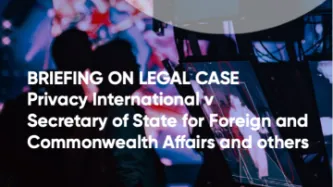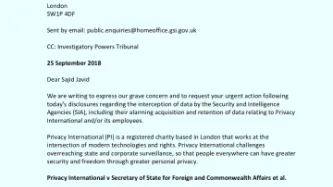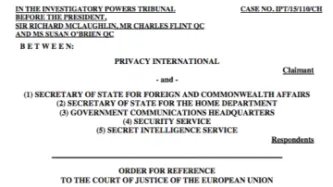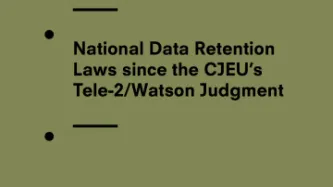Advanced Search
Content Type: Press release
Today the European Court of Human Rights held the United Kingdom accountable for its digital spying, even when that spying affects people outside of the UK’s borders.In this case, Mr Wieder and Mr Guarnieri, both researchers who work on information security and privacy, challenged the lack of access to redress mechanisms for alleged breaches to their rights to privacy and freedom of expression by UK intelligence agencies before the European Court of Human Rights.Mr Wieder and Mr Guarnieri…
Content Type: Video
In January 2023, the UK's Investigatory Powers Tribunal handed down a landmark judgment. The Tribunal held that there were “very serious failings” at the highest levels of MI5 - the UK's domestic intelligence agency - to comply with privacy safeguards from as early as 2014, and that successive Home Secretaries did not to enquire into or resolve these long-standing rule-breaking despite obvious red flags.
In this episode, we talk to Meg Goulding, a lawyer at the UK-based campaigning…
Content Type: Long Read
We won our case against the UK’s Security Service (MI5) and the Secretary of State for the Home Department (SSHD). The Investigatory Powers Tribunal (IPT) – the judicial body responsible for monitoring UK’s intelligence and security agencies – held that MI5 acted unlawfully by knowingly holding people’s personal data in systems that were in breach of core legal requirements. MI5 unlawfully retained huge amounts of personal data between 2014 and 2019. During that period, and as a result of these…
Content Type: Press release
In a landmark judgment, handed down today (Monday 30 January 2023), the Investigatory Powers Tribunal have found that there were “very serious failings” at the highest levels of MI5 to comply with privacy safeguards from as early as 2014, and that successive Home Secretaries did not to enquire into or resolve these long-standing rule-breaking despite obvious red flags.
Human rights organisations Liberty and Privacy International, who brought this significant legal case in January 2020, have…
Content Type: Long Read
Additionally, in January 2020 Privacy International and UK-based NGO Liberty filed a new claim against MI5 and the Secretary of State for the Home Department in the Investigatory Powers Tribunal (the “Ungoverned Spaces Case”, this time, the case sought to hold MI5 and the SSHD accountable for systemic, long-term failures in the way they handle and retain millions of people’s personal data. As part of this claim, PI requested that the IPT re-opens parts of the original BPD/BCD. This aspect of…
Content Type: News & Analysis
What happened
On 22 July 2021, the Investigatory Powers Tribunal (IPT) issued a declaration on our challenge to the UK bulk communications regime finding that section 94 of the Telecommunications Act 1984 (since repealed by the Investigatory Powers Act 2016) was incompatible with EU law human rights standards. The result of the judgment is that a decade’s worth of secret data capture has been held to be unlawful. The unlawfulness would have remained a secret but for PI’s work.
You…
Content Type: News & Analysis
In mid-2019, MI5 admitted, during a case brought by Liberty, that personal data was being held in “ungoverned spaces”. Much about these ‘ungoverned spaces’, and how they would effectively be “governed” in the future, remained unclear. At the moment, they are understood to be a ‘technical environment’ where personal data of unknown numbers of individuals was being ‘handled’. The use of ‘technical environment’ suggests something more than simply a compilation of a few datasets or databases.
The…
Content Type: News & Analysis
The Watson/Tele2 decision of the CJEU concerned section 1 and 2 of DRIPA and the Data Retention Regulations 2014. This contained the legislative scheme concerning the power of the Secretary of State to require communications service providers to retain communications data. Part 3 of the Counter-Terrorism and Security Act 2015 amended DRIPA so that an additional category of data - that necessary to resolve Internet Protocol addresses - could be included in a requirement to retain…
Content Type: Advocacy
RESPONSE OF PRIVACY INTERNATIONAL TO THE CONSULTATION ON THE GOVERNMENT’S PROPOSED RESPONSE TO THE RULING OF THE COURT OF JUSTICE OF THE EUROPEAN UNION ON 21 DECEMBER 2016 REGARDING THE RETENTION OF COMMUNICATIONS DATA
[Full response below]
Introduction
The consultation is in response to the judgment in Tele2 Sverige AB v Post-och telestyrelsen (Case-203/15) and R (Watson) v Secretary of State for the Home Department (Case C-698/15) [“Watson judgment”].
The case concerned…
Content Type: Explainer
In 2000, the Government told Parliament that the Regulation of Investigatory Powers Act 2000 (RIPA) was the total extent of surveillance powers that were needed. However, within weeks of RIPA receiving Royal Assent, a report from UK law enforcement was leaked, stating that the power the Government truly wanted was companies to retain communications data on all their users.
Immediately after 9/11 as governments around the world over-reached with new pieces of…
Content Type: Long Read
The UK's domestic-facing intelligence agency, MI5, today admitted that it captured and read Privacy International's private data as part of its Bulk Communications Data (BCD) and Bulk Personal Datasets (BPD) programmes, which hoover up massive amounts of the public's data. In further startling legal disclosures, all three of the UK's primary intelligence agencies - GCHQ, MI5, and MI6 - also admitted that they unlawfully gathered data about Privacy International or its staff. You can read the…
Content Type: Press release
We found this image here
The Investigatory Powers Tribunal (IPT) today held that, for a sustained period, successive Foreign Secretaries wrongly gave GCHQ unfettered discretion to collect vast quantities of personal customer information from telecommunications companies.
The judgment exposes:
· the error-ridden and inconsistent evidence provided by GCHQ throughout the case;
· the willingness of telecommunications companies to secretly hand over customer data on the basis of mere verbal…
Content Type: Press release
Hearing: Cross examination of senior GCHQ official about Intelligence Agencies’ use of massive databases of information about everyone in the UK
When: Monday 26 February 2018, 3.15pm
Where: Royal Courts of Justice, Court 28, Strand, London WC2A 2LL
Summary
This is the first time GCHQ have given open evidence in the Investigatory Powers Tribunal (The Tribunal). It is also the first time they will be cross examined by Privacy International on serious misleading errors they provided in…
Content Type: Press release
The Case
Privacy International v Secretary of State for Foreign and Commonwealth Affairs et al. (Bulk Personal Datasets & Bulk Communications Data challenge)
Date: 5-9 June 2017
Time: from 10:00 onwards
Location: Royal Courts of Justice, The Strand, London WC2A 2LL United Kingdom
Hearing overview
Next week’s hearing follows the Investigatory Powers Tribunal’s earlier judgment in October 2016, which ruled that three issues are to be determined:
…
Content Type: Long Read
On 8 September 2017, the Investigatory Powers Tribunal decided to refer questions to the Court of Justice of the European Union (‘CJEU’) concerning the collection of bulk communications data (‘BCD’) by the Security Intelligence Agencies from mobile network operators.
The BCD regime was initially secret. In an earlier judgment, the Investigatory Powers Tribunal ruled that the regime was not compliant with the European Convention on Human Rights prior to its public avowal, but (subject to…
Content Type: Advocacy
This report sheds light on the current state of affairs in data retention regulation across the EU post the Tele-2/Watson judgment. Privacy International has consulted with digital rights NGOs and industry from across the European Union to survey 21 national jurisdictions (Austria, Belgium, Bulgaria, Croatia, Cyprus, Czech Republic, France, Germany, Hungary, Ireland, Italy, Luxembourg, the Netherlands, Poland, Portugal, Romania, Slovakia, Slovenia, Spain, Sweden, and the United…
Content Type: Legal Case Files
A skeleton argument is a document produced for the court. It is more usually produced as a means of presenting the skeleton or ‘bare bones’ of a case before a trial.
The skeleton arguments cross-reference documents in the bundles. There is a consolidated index here: [Consolidated Index]
References in the form [Bundle/Tab/Page] are to the following bundles:
Bundles used for the July 2016 hearing, namely ‘Core’ and bundles numbered consecutively 1 to 5
Supplemental bundle prepared for the…

















